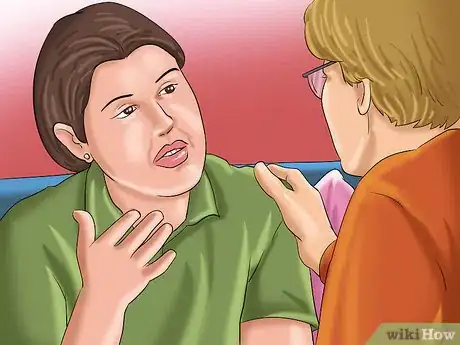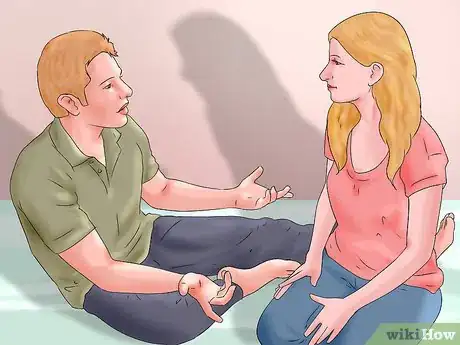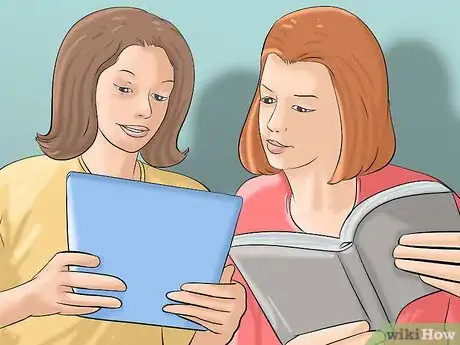This article was co-authored by Kelli Miller, LCSW, MSW. Kelli Miller is a Psychotherapist based in Los Angeles, California. Kelli specializes in individual and couples therapy focusing on relationships, depression, anxiety, sexuality, communication, parenting, and more. Kelli also facilitates groups for those struggling with alcohol and drug addiction as well as anger management groups. She is the author of “Professor Kelli’s Guide to Finding a Husband” and the award-winning and best-selling book “Thriving with ADHD”. Kelli co-hosted an advice show on LA Talk Radio and is a relationship expert for The Examiner. She received her MSW (Masters of Social Work) from the University of Pennsylvania and a BA in Sociology/Health from the University of Florida.
There are 7 references cited in this article, which can be found at the bottom of the page.
This article has been viewed 100,382 times.
Giving healthy, constructive relationship advice requires patience, understanding, and honesty. Be wary of giving unsolicited relationship advice, as this may do more harm than good.[1] Whenever discussing someone’s relationship, actively listen to what your friend or loved one is saying, and focus on providing them with the support they need.
Steps
Helping People Be Their Own Advisors
-
1Let them do the talking. Even when people ask for advice about their relationship, they may simply be looking for your support. Whether or not they need your advice, the first step is listening.[2]
- Since whomever you’re speaking with knows more about their own relationship than you do, they likely also have an inclination about how to handle whatever it is they’re talking about.
- Let them rant a bit. People may be looking more for validation of their feelings, or simply to vocalize their thoughts on their relationship with someone they trust.
- State your willingness to listen. If someone brings up their relationship but is hesitating, tell them you’re glad to hear about how they’re feeling.
-
2Use active listening.[3] A key aspect of truly listening to someone is refraining from judging their statements. Disallow yourself from diagnosing or analyzing their statements until they’ve finished speaking.[4]
- To convey that you’re actively listening, and to ensure that you’re understanding the other person clearly, paraphrase and repeat the key points of their dialogue back to them.
- Pay attention to your nonverbal cues as well. Maintain eye contact, square your shoulders towards the speaker, and even use supportive touching to convey that you’re there for someone.
Advertisement -
3Pay attention to the way you frame your responses. Avoid responses that may come across as judgmental or critical, as this will not be productive - and you may even offend whomever you’re speaking with.[5] Try to talk more with "I" statements rather than accusatory "you" statements.[6]
- Avoid statements such as “You should have _____” or “Why didn’t you _____?”.
- Definitely don’t say anything like, “I would have _____ by now!”[7] Even if you mean to be supportive, this may offend the person you’re speaking with.
- Instead, start with statements such as “It may help to consider _______” or “I don’t know if this will work for you, but I’ve found that _______.”
-
4Bounce their own thoughts back at them. Even if you have some of your own ideas about what the right course of action might be, emphasize points that they’ve said themselves.[8]
- If there’s a lull before you have something constructive to say, don’t make something up just to say something.
- Instead, try something like, “I certainly don’t know the best course to take for you in your relationship, but I’m happy to work through what you’re feeling with you.”
- Ask them to expand on certain thoughts that seem significant by saying things like, “What are your thoughts regarding that?” or simply “Say more about that.”
-
5Express concern. Don’t use statements that may seem to minimize their feelings or that don’t offer anything constructive.[9] Ensure that they know you’re hearing both what they’re saying about how they’re feeling.
- Avoid focusing on the details of a story – you’re not here to gossip, you’re here to help.
- Don’t refer to issues as a “phase.”
- If they’ve been hurt, recognize that with statements such as, “I imagine that’s really affected how you’re feeling.”
-
6Act immediately on revelations of abuse. Some relationships are objectively unhealthy. If someone tells you about any form of abuse that is taking place, tell them that you’re there for them and urge them to get help.[10]
- Do not allow a friend or loved on accept a lover’s addiction, recurrent affairs, or emotional or physical abuse as “normal.”
- If someone seems to be in danger, notify other people who may be able to help them and make a point of being available for them.
- There may be more going on then they’re admitting, and providing them to space to recognize and report serious issues is extremely important.
Offering Helpful Relationship Advice
-
1Be sure your advice is desired before offering it. Sometimes, people simply don’t know what to do and are actively looking for guidance. Still, talking with them might allow them to formulate ideas of their own.[11] The point is, always be sure someone wants advice on their relationship before blurting your thoughts out.
- One way to avoid giving distracting or unnecessary advice is to ask questions.
- A great one to start with is, “Do you have any ideas about how to address _______?”
-
2Remind your friend or loved one that most relationships problems are universal. Concerns about sex, communication, and financial decision-making are especially common. Though simply a statement of fact, this point can provide comfort in knowing that other people in other relationships go through the same thing.[12]
-
3Ensure that any suggestions you make are simple, operable, and safe. A great piece of advice is a gentle suggestion that they communicate in a new, potentially more clear way with their partner.[13]
- Offer to role play with them, even, and begin with sentences like, “I wanted to talk with you about what each of our expectations and contributions are regarding ________.”
- Recommend the use of “I” statements, both as a method of communicating, and reflecting.
- A classic reminder to employ is “If I don’t speak up, I can’t expect other people to know what I want.”
-
4Tell them to write their partner an “I appreciate…” list. In the interest of rekindling affection and admiration, have them sit down and write down a few things they appreciate about their partner.[14]
- Tell them to include examples of how their partner demonstrates the characteristics on the list.
- Encourage your friend or loved one to share the list with their partner. This might help kick-start a positive and loving conversation, during which others important discussions can happen too.
-
5Remind them that it really is the little things. In a committed relationship, simple, everyday interactions matter immensely. If there are concerns about romance dwindling, recommend a few tips to help lovers stay in tune with one another.[15]
- Though it may seem silly, point out that couple who store up positive sentiments towards one another will be more ready to deal with incidences of stress or conflict.
- Remind them to tell their partner that they value their relationship, especially in unexpected moments.
-
6Don’t get caught up on abstractions. People often worry about how and whether they or their partner has changed, or might be changing, or will change. Remind your friend or loved one that people do grow and change, and that they grow and change together.[16]
- Remind your friend or loved one, “You’re a team; you and your partner should change and grow together!”
- Advocate for cooperative decision-making and sharing of common ground.
- Neither side of a relationship should control everything; encourage your friend or loved one to pursue the middle ground whenever possible.
Advising Someone to Find Written Relationship Advice
-
1Recommend something for them to read. Fortunately, there are professionals out there who study relationships, and written a plethora of advice on the topic.[17]
- Arriving at a realization via reading may simple feel better than receiving a lecture, even from a trusted confidant.
- Reading some objective advice may help your friend feel empowered and confident by arriving at their own determinations about how to handle relationships woes.
- Doing some reading of your own may help you give them advice, and find something that particularly pertains to their situation – even if they don’t recognize it yet.
-
2Make sure they avoid low quality, problematic advice from “women’s” magazines. Academic studies have examined the information and advice on relationships and sexuality included in such magazines and have come to some startling findings.[18]
- Magazine advice columns consistently regurgitate assumptions and stereotypes that do not reflect the diversity of the types of relationships people have.
- In particular, avoid publications such as Cosmopolitan, that have repeatedly indicated that women are responsible for changing men, as well as themselves, in order to improve and maintain their relationship.
-
3Make sure they aren’t reading “men’s” magazines either. Most magazines geared towards “men” also include relationship advice featurettes. Do not allow this potentially harmful information to dictate decisions about relationships.[19]
- Again, messages geared towards one specific gender are often consistent with stereotypical, sometimes problematic assumptions about gender socialization.
- In “men’s” magazines, advice often revolves around a predictable obsession with reinforcing male masculinity.
- Be wary of relationship advice that makes sex a top priority. Often, this sort of advice is actually contrary to advice on how to form meaningful intimate relationships.
References
- ↑ http://spr.sagepub.com/content/early/2015/06/30/0265407515592262.abstract
- ↑ http://tinybuddha.com/blog/10-tips-advise-wisely-how-to-give-advice-that-actually-helps/
- ↑ Kelli Miller, LCSW, MSW. Psychotherapist. Expert Interview. 11 June 2020.
- ↑ http://www.wsj.com/articles/be-there-for-a-friends-relationship-crisis-but-dont-give-advice-1423504783
- ↑ http://tinybuddha.com/blog/10-tips-advise-wisely-how-to-give-advice-that-actually-helps/
- ↑ Kelli Miller, LCSW, MSW. Psychotherapist. Expert Interview. 11 June 2020.
- ↑ http://www.wsj.com/articles/be-there-for-a-friends-relationship-crisis-but-dont-give-advice-1423504783
- ↑ http://tinybuddha.com/blog/10-tips-advise-wisely-how-to-give-advice-that-actually-helps/
- ↑ http://www.wsj.com/articles/be-there-for-a-friends-relationship-crisis-but-dont-give-advice-1423504783
- ↑ http://www.wsj.com/articles/be-there-for-a-friends-relationship-crisis-but-dont-give-advice-1423504783
- ↑ http://tinybuddha.com/blog/10-tips-advise-wisely-how-to-give-advice-that-actually-helps/
- ↑ http://www.wsj.com/articles/be-there-for-a-friends-relationship-crisis-but-dont-give-advice-1423504783
- ↑ http://www.wsj.com/articles/be-there-for-a-friends-relationship-crisis-but-dont-give-advice-1423504783
- ↑ http://psychcentral.com/blog/archives/2012/01/08/7-research-based-principles-for-making-marriage-work/
- ↑ http://psychcentral.com/blog/archives/2012/01/08/7-research-based-principles-for-making-marriage-work/
- ↑ http://psychcentral.com/blog/archives/2012/01/08/7-research-based-principles-for-making-marriage-work/
- ↑ http://tinybuddha.com/blog/10-tips-advise-wisely-how-to-give-advice-that-actually-helps/
- ↑ http://www.tandfonline.com/doi/abs/10.1080/15332690802237987
- ↑ http://www.tandfonline.com/doi/abs/10.1080/08952833.2010.503795



-Step-4.webp)
-Step-5.webp)


-Step-9.webp)
-Step-22.webp)













-Step-3-Version-2.webp)





















































Medical Disclaimer
The content of this article is not intended to be a substitute for professional medical advice, examination, diagnosis, or treatment. You should always contact your doctor or other qualified healthcare professional before starting, changing, or stopping any kind of health treatment.
Read More...